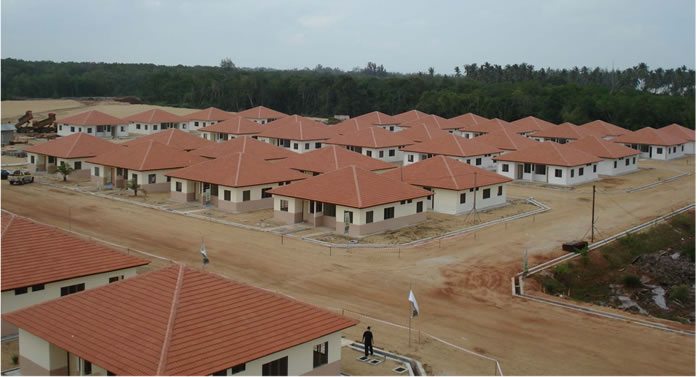Real estate stakeholders have applauded the 2017 appropriation of US$472.8 million housing budget, and called for its proper use to address the 17 million housing shortage in the country.
Lookman Oshodi, Project Director, Artic Infrastructure, said if the budget is matched with the works ministry’s intention of building 40 blocks of housing through direct construction in each of the 27 states that have made land available, there could be the possibility of achieving about 6,480 units. He added, however that the budget may not be sufficient to deliver the units along with the complimentary infrastructure.
He stressed that the concept of adopting made-in-Nigeria building materials, if available in the right quantity by the federal government, could be the right step that will strengthen budget performance.
“The federal ministry said the houses will be constructed through direct construction model while in another it is looking at private sector as developers to increase the supply of housing.
“There is need to have clarity in the delivery model as this will have huge tactical implications on the budget outlay and other housing development indicators.
“Equally important is the actual field or project disbursement period for the budget sum of US$472.8 million. This will likely be in August or September 2017 which is five to four months before the end of 2017, eroding housing delivery intentions for the year,” he said.
The chairman, Estate Surveyors and Valuers Registration Board of Nigeria (ESVARBON), Mr. William Odudu, said the disbursement of the funds and for what sector of housing would determine its effectiveness and benefit to the people of the country.
“I have always maintained that the government should concentrate on housing for the needy, the low income earners and not for the well-to-do or high income earners. If the budgeted funds are channelled to housing the low income earners, it will go a long way to reducing the housing deficit,” he said.
On the provision of N100 billion for social housing in the 2017 budget, Odudu said it was a good sign that government was thinking seriously on how to subsidise the cost of housing for the low-income earners or those that cannot have access to housing loans.
He said government should find ways of providing cheap and affordable housing for those that need to be housed or given shelter.
“Government must take care of those who cannot afford to buy their homes or who have no access to housing loans.
He enjoined government to stop withholding fund budgeted for housing sector.
But the immediate past president of the Association of Housing Corporations of Nigeria (AHCN), Dr Ifenna Chukwujekwu, said it is not yet uhuru for the built environment until the money is released.
Chukwujekwu, who is also the Real Estate Developers Association of Nigeria (REDAN), Vice President South East, said proper analysis of the allocation would be done on the release of the money and not on mere allocation.
Also, the chairman, Lagos Chapter of Nigerian Institute of Quantity Surveyors (NIQS), Dele Mafimidiwo, commended the federal government for the budgetary allocation.
He said; “The government has taken a bold step to start from somewhere though it may be a very small amount when we consider the 17 million housing deficit in the country.If government can continue to earmark fund continuously like that, it will definitely go a long way in solving the housing shortage.”
Mafimidiwo also commended the federal government on its commitment to social and national housing programmes, saying it would gradually help in mitigating against housing shortages in the country.
He, however called for private sector participation because, according to him, government alone could not solve the problem of housing shortages.
Oshodi, an architect, described the US$328.2 million budget for new social housing programme as a welcome development.
He said it appeared that the federal government was on track to actualising the provisions of Chapter eight of the National Housing Policy on social housing.
The budget, he said, may however not achieve the desired results because of lack of implementation structures.
“Apart from Cross River State that has institutionalised social housing policy, other states are yet to have institutional commitment to the housing model.
“Since the states have been identified as the implementing partners in the national policy, the current budget should go into supporting the states to build institutions and processes that will drive social housing in their respective urban and rural communities.
“Attempts to construct houses at this stage under a social housing scheme will amount to waste of scarce public resources.
“On the other hand, the N41 billion federal government’s National Housing Programme needs further clarity on its goal, objectives, delivery strategies and beneficiaries.
“If it will be delivered as an integral part of agriculture settlements, being developed by the job creation unit under the office of the Vice President, it is a good approach of decentralising qualitative housing delivery in secondary cities and rural communities across the country,” he said.
